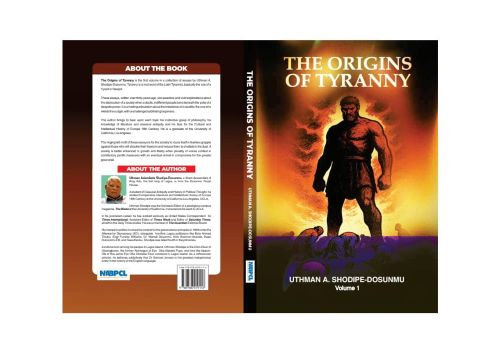A former Editor within the Daily Times stable, Prince Uthman Ademilade Shodipe-Dosunmu, has come out with a 30-chapter book ‘The Origins of Tyranny’.
The Origins of Tyranny is the first volume in a collection of essays by Shodipe-Dosunmu, who hails from Dosunmu Royal House. He is a direct descendant of King Ado, the first king of Lagos.
Tyranny is a root word of the Latin Tyrannia, basically the rule of a Tyrant or Despot.
These essays, written over thirty years, according to him, “are assertive and vivid explorations about the destruction of a society when a docile, indifferent people bend beneath the yoke of a despotic power. “It is a riveting articulation about the imbalance of a caudillo, the one who wields the cudgel, with unchallenged arbitrating largeness”.
Also Read:
- We’ll prioritise electoral reforms, security, Nigerians’ welfare — Speaker
- Finally DSS removes Arogundade’s name from Watchlist after 40 years
- Gunmen kill six residents in fresh Plateau attack
- Delta Assembly Speaker, 21 PDP lawmakers defect to APC
- Court sentences 27-year-old man to life imprisonment for defiling a minor
The author brings to bear upon each topic his instinctive grasp of philosophy, his knowledge of literature and classical antiquity and his bias for the Cultural and Intellectual History of Europe 18th Century.
He is a graduate of University of California, Los Angeles.
“The ringing leit motif of these essays is for the society to rouse itself in fearless grapple against those who will shackle their freedom and reduce them to chattels in the dust.
“A society is better enhanced in growth and liberty when plurality of voices contest in contributory pacific measures with an eventual arrival in compromise for the greater good of all”.
Below is a snippet of the first chapter:
CHAPTER ONE
HOW VILLAINY BECOMES ROUTINE
First Published in The Guardian, Tuesday September 24, 1996.
PERHAPS, more than anyone else, it was the Nazarene who had a total grasp of the bounds of he¬roic identification; the limits of right¬eous defiance amid the buffetings of iniquity. From the profound reaches of his beatific vision the Nazarene could discern the diminishing re¬course of the human nature. He could see the faithlessness of the human vista, the wavering promptings of those harassed by the cruel annoyances of fate…


